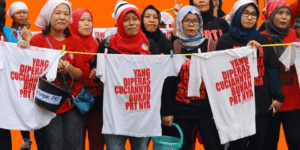Dear fathers, child immunization is not only the mother’s business, but also the father who has to take care and be responsible.
Because actually in this world there is no sentence stated that: this is the father’s child, or: this is the mother’s child. There are, these are father and mother’s children. That’s why, caring, nurturing, loving, for the children’s growth and development must involve both parents, father and mother.
Bram Setiawan, a man who lives in Jakarta who for the past 2 years has been enjoying his new role as a father, has this opinion, that immunization is a matter for both partners.
“I just have a simple way of thinking. It’s a joint child, not just my wife’s child or just my child. So I think if the need (immunization-ed) exists, it should be done together,” said the man who works as a housewife and freelancer when talking with Konde on Thursday (24/3/2022).
Bram admitted that he and his wife try to remind each other and get involved so that their children get immunizations on time and regularly. As a freelancer, Bram then also took a lot of work at home.
“Remind each other with the wife because it’s related to the time we both work,” he added.
This was also experienced by Ubaidillah, a father in Purwokerto. In a virtual interview conducted by Konde on Sunday (27/3/2022), he talked about his role in immunizing his children, namely to pick them up and checking information on immunizations listed in the maternal and child health manual provided by their doctor.
Ubaidilah also takes the doctor queue and picks up his wife and children after going to the doctor.
“I prefer my wife to remind me, for example, ‘Dad, tomorrow is the immunization schedule’, so I’m in charge of taking the queue number at the hospital, what time will I pick them up. It’s true that when a wife is pregnant and gives birth, she got a book, there are instructions in the book that at certain age what immunizations should be given, that’s the guidelines we followed. Anyway, I can only make sure that all the columns in the manual have been done, nothing should be missed,” he explained.
Konde Survey Results: Where is the Role of Fathers in Child Immunization?
To find out more detail and actuality regarding the role of fathers in child immunization, Konde conducted a simple survey with the target respondent of fathers.
In the survey, Konde tried to explore the knowledge of fathers regarding complete routine immunization, how the role of fathers in ensuring their children get complete routine immunization rights so far, and what obstacles and challenges they experienced in doing so.
The survey uses the Google Form platform, distributed over 13 days from March 15-28, 2022. This survey applies the snowballing method, rolling from one person to another, and seeks to find as many respondents as possible. This survey certainly does not describe the views and attitudes of fathers as a whole in Indonesia, but can be part of the picture about the role of fathers in providing immunizations for children.
This survey was filled by 70 respondents. In the data processing stage, 1 respondent was excluded from the raw data because the respondent had not yet become a father. Thus, the total number of respondents was 69 people.
For the age category, as many as 33 people are aged 30-40 years old, 24 people are over 40 years old, and 12 people are around 20-30 years old. For the old category of becoming fathers, 39 people were more than 4 years, 15 people around 1-2 years, 11 people around 3-4 years, and 4 people less than one year. For the category of number of children, 34 people have 1 child, 21 people have 2 children, 13 people have 3 children, and 1 person has more than 4 children.
For the job category, the five most jobs are 45 private employees, 8 civil servants, 4 journalists, 3 entrepreneurs, 2 BUMN employees. The rest, claiming to be housewives, teachers, photographers, freelancers, traders, and artists. Meanwhile, for the wife’s job category, the three most jobs are 34 housewives, 22 private employees, 6 civil servants, and the rest are entrepreneurs, BUMN employees, academics, and freelancers.
Specifically regarding immunization, the results of Konde’s survey found that, of all respondents, there were 60 people or 87 percent who claimed to know what complete routine immunization was for children, and 9 other people or 13% admitted that they did not know it. Konde then elaborated with open-ended questions for respondents who answered ‘yes’, and the results showed that in general the answers of fathers regarding complete routine immunization were correct.
Complete routine immunization is one way to prevent the spread of disease. This immunization consists of routine and advanced basic immunizations that are given since the baby is born and are continued according to a predetermined schedule.
View interactive graphics here
In terms of knowledge of the benefits of immunization for children, as many as 65 people (94.2 percent) of respondents who filled out this survey said they knew what the benefits of complete routine immunization were for their children. The rest, as many as 4 people (5.8 percent) admitted that they did not know about it. In the elaboration question, the answers of the fathers who answered ‘yes’, also showed the average correct answer.
View interactive graphics here
Many types of health problems or dangerous diseases that can be prevented by immunization (PD3I) such as: tuberculosis, measles, pneumonia, liver failure and liver cancer, wilt paralysis, diphtheria, pertussis, tetanus, Hepatitis B and meningitis. These diseases can cause disability and death.
Immunization is one of the most effective disease prevention methods, especially in reducing infant and under-five mortality. Ironically, in the latest UNICEF report, the number of Indonesian children who do not receive immunizations is the third highest in the world, behind India and Pakistan.
In fact, if complete routine immunization is carried out evenly in all regions, Indonesia will be able to prevent the PD3I outbreak from becoming a major disaster for the wider community. Immunization that can also form herd immunity will prevent disease in people who can’t get immunized, such as autoimmune patients or cancer. Simply put, the more children who are immunized, the less will be infected with the disease.
Furthermore, regarding the role of fathers in ensuring that their children’s immunization rights are fulfilled, as many as 32 respondents (46.4 percent) admitted to taking their children to health care facilities for immunization, 15 respondents (21.7 percent) admitted to recording their child’s immunization schedule and ensuring that their children were not immunized. immunized on time, 15 respondents (21.7 percent) admitted to looking for detailed information related to complete routine immunization, and the rest gave varied answers such as doing the three things above, buying insurance, and others.
View interactive graphics here
Stigma on the Role of Fathers
It turned out that the story about the stigma on the father who played a role in this child was experienced by both Bram and Ubaidillah. They both stated that not all fathers can carry out as they do in the process of child immunization.
According to them, one of the things that makes fathers less involved or fully involved in child immunization is because of views that indirectly stigmatize and limit the ability of fathers to carry out their roles.
“Sometimes, there are those who think, well, immunization is a wife’s business, husband’s business is work,” said Bram.
Ubaidillah also said, “The people’s mindset is that the child’s business is the mother’s business, the father’s business is making money, in Indonesia it is difficult to change.”
This perspective that divides the roles of husband and wife in a dichotomous way has deep roots in Indonesian society. Ubaidillah admitted, personally he was sometimes still trapped in this perspective. So, he must periodically remind himself to dare to change that perspective in himself.
“I’m also still the same until now, the posyandu business, the immunization details are all sorts, it’s all my wife’s business, I’m just looking for money and delivering immunizations, that’s all. Still trying to change that way of thinking. We must dare to change that mindset, that we should take care of the children together.”
An academic study by Hilda Yani (2013) which examined the role of fathers in the completeness of immunization in Deli Serdang, North Sumatra, found that there were many factors that resulted in the low role of fathers in immunization efforts, namely: motivation, occupation, education level, and sources of information. obtained regarding immunization.
The factors of father’s busyness and fatigue during activities were the most common reasons for the findings. This makes fathers less active in giving immunizations to their babies. Fathers, socially, are required to work hard to earn a living to meet the needs of the family, which ultimately makes fathers feel always busy and tired. This results in a lack of motivation for fathers to accompany their babies in giving immunizations.
This is similar to Bram’s statement, “There is still a view that men who are not tired by looking for money, they are not considered serious as husbands.”
In the survey, Konde then explores the obstacles that fathers usually face when trying to ensure the fulfillment of their children’s immunization rights. As a result, as many as 23 respondents or 33.3 percent stated that immunization was carried out during working hours, 11 people or 15.9 percent said they did not have time because there was too much work in the office, 18 respondents or 26.1 percent said there were no obstacles, 4 respondents or 5.8 percent stated that there is no role model of a father figure who cares about child immunization that can be imitated in personal life.
Other respondents answered with varied answers such as difficulty to get permission from superiors (1.4 percent), immunization is the wife’s responsibility (1.4 percent), there is no information on good health care places and easy to reach from home (1.4 percent), effects after immunization (1.4 percent), long queues (1.4 percent), forgetting to schedule (1.4 percent), pandemic (1.4 percent), not knowing where to start playing the role of a father (1, 4 percent), and so on.
View interactive graphics here
Flexibility of working time in the office is a crucial thing that fathers need. Like Bram, who does not face any obstacles because of dynamic working hours and can be discussed openly with his superiors.
“Yes, it’s still flexible. If, for example, we have set a schedule for example immunization on the 15th, yes, on the 13th, I have already told my superiors, there is no need to change holidays, but I start working at that time,” said Bram.
Likewise with Ubaidillah. “There is no problem, coincidentally the place between the house and the hospital and the office is not that far away. My position is not in operations, but in business. In business, the time is more flexible because we also go to the field so we can do it at once. So usually when I deliver them, take the queue number, then leave it for a while, then pick them up again.”
However, these two fathers, who both have a child, do not deny that until now there are still offices that do not allow freedom and even stigmatize fathers when they want to carry out their role in child immunization. This makes fathers reluctant to simply ask for permission to accompany their children to immunize.
“Because it’s thought to be lazy, it’s like looking for a loophole to reduce work activities, you know,” said Bram.
In fact, according to Ubaidillah, a man who has worked in the managerial department of a banking institution for about 10 years, granting such permission is very important for fathers because it is closely related to a father’s work motivation.
“For me all this time, if there are employees who have permission for their children to be immunized, I will order them to deliver immunizations first, I will ask about how long it will take, the important thing is that while he is away, he has back-up, whether it is his colleague or his immediate superior. The important thing is that office operations can continue to run normally. Now when he is given such permission, he feels happy, enjoys it, I am sure the results of his work are also maximal, instead of blocking them, or judging them, it becomes demotivating, so it is not productive for employees.”
These fathers’ obstacles were validated by Alifah Davida, a volunteer for the Concerned Parents Foundation (YOP)-a foundation that works on child care and health issues. However, according to him, there are still alternatives to overcome the obstacle in the form of the lack of flexibility in working time.
“Actually, immunization can be done during the weekend, right, immunization is something that doesn’t have to be done exactly on the exact date, there is a leniency of 7 days before and 7 days after, it’s still calculated on time. So, it is related that because the office is not allowed to deliver immunizations to children, it can be delivered at night, it can also be delivered during the weekend, that could be an alternative,” he explained to Konde through a virtual meeting on Thursday (31/3/2022).
Effect of Father’s Consent and Involvement in Immunization Success
Konde’s survey also explored fathers’ consent regarding immunization. In terms of consent, as many as 98.6 percent or 68 respondents to the Konde survey answered that they agreed that their children received complete routine immunizations. Meanwhile, the remaining 1 person (1.4%) admitted that they did not approve of their child receiving complete routine immunizations.
View interactive graphics here
Father’s approval will play a role in the success of achieving complete routine immunization for children. Research from the Ministry of Health and UNICEF in August 2020 stated that fathers’ rejection of vaccines for their children for various reasons was one of the causes of low immunization coverage. The study also stated that most of the respondents stated that the decision to give immunizations for children was influenced by their partner, and a small portion, around 27 percent, decided on their own.
Vida Parady, a YOP volunteer, confirmed these findings. Based on his experience when conducting a study related to immunization in one of the provinces in Indonesia, ignorance that led to fathers’ disapproval made immunization achievements in the regions low.
“In that area it is more concerning. Because fathers don’t understand the benefits of immunization and the risks that if their children are not immunized, it can lead to disability and death, yes, so they often think ah never mind, take it easy, or think ah, it’s not clear whether it’s halal or haram, or simply When I dug deeper, there were people who really didn’t allow it because their children were fussy when they were immunized, ‘I can’t sleep, I’m tired,’” he told Konde through a virtual meeting on Thursday (31/3/2022).
He added that this view puts mothers who live in the area in a difficult situation.
“It’s going to be difficult, the mother wants it, the father doesn’t allow it. Even though the free posyandu doesn’t interfere with money, the mother is afraid that if her child is fussy, hot, their hands are swollen, they got caught being immunized.”
While on the other hand, a collaborative study of Makerere University and Birmingham City University (2016) which examined immunization in Uganda found that full involvement of fathers in immunization would increase the success of a complete routine immunization for children. However, the low role of fathers in immunizing their children is rarely emphasized in immunization programs or research.
Konde tried to ask for a response from the Ministry of Health regarding the research findings and confirm what interventions the government has taken to increase the role of fathers in immunization, but until this article was published, the Ministry of Health has not yet confirmed
Not only mother, father must also be proactive
The efforts of parents in terms of immunization are very crucial in efforts to maintain the children’s health and quality of life.
Konde’s survey finds out what efforts fathers are making to increase information about immunization and child health. As a result, as many as 28 respondents (40.6 percent) admitted to asking doctors, 13 respondents (18.8 percent) read books, 10 respondents (14.5 percent) searched for information on the internet, and 10 respondents (14.5 percent) asked questions. wife, 6 respondents (8.7 percent) attended health and parenting seminars, 1 respondent (1.4 percent) asked a friend, and 1 other respondent (1.4 percent) sought all information about baby care.
View interactive graphics here
Vida Parady emphasized that parents should take the initiative and be proactive in enriching their knowledge and empowering themselves by digging up as much information as possible regarding immunization.
“Quite a lot of parents often take it for granted, or you could say that they are ignorant. They are very dependent on health workers to tell them, ‘Here, I will give this to the child, come again in 3 months, sir/ma’am’, usually the parents don’t feel the need to memorize, for example, ‘Oh, this month the baby must be immunized’, Most of the time, just look at the health card, take it, and then the doctor will say something, they just give up. Now at YOP, parents are encouraged to really understand immunization, so they understand what immunizations need to be given, when to give them, what are the risks, what are the benefits, what diseases are prevented from immunization. They understand why the schedule is strictly adhered to, especially when a baby is under 1 year old, there is a reason why, for example, the baby is given at this month, at that month, everything has a scientific reason, that must really be considered.”
To note, YOP is an institution consisting of a group of parents and doctors who care about the health and environmental conditions of children in Indonesia. Since its establishment in 2003, YOP has been actively educating parents about children’s health topics through mailing lists and websites. In 2012, YOP then formed a group on Facebook called GESAMUN (Movement for Immunization Awareness). This group provides a discussion room related to immunization in the scientific corridor: evidence based medicine and evidence based practice. Currently, the GESAMUN group has nearly 142,000 members.
He then explained that parents also need to understand the rights of their children to receive immunizations simultaneously. This means that children can get several types of vaccines at once in one visit. Immunization in this way can reduce children’s exposure to bacteria and viruses when outside the home because children do not have to go back and forth to health services, and ensure vaccines are given on time.
In addition, he also reminded parents to do catch-up immunization, which is to catch up on vaccines that have not been obtained by children before the age of 2 years, or a maximum before the children enter school.
“So it’s often the parents, either for negligent reasons or what, their children miss their immunizations, especially the advanced ones, which are not covered or subsidized by the government, we have to catch up. There are vaccinations that are one, two, three, that’s what parents often forget, so it’s advisable to catch up, rather than not coming at all, “said Vida.
According to Kinanti Pinta Karana, Communication Specialist at UNICEF Indonesia, to increase parental involvement in immunization, education for parents needs to be strengthened by various parties.
“Education should be carried out with the principles of empathy, transparency and credibility. In addition, in the field, cadres and stakeholders need to be mobilized to support parents,” he said when contacted by Konde on Thursday (31/3/2022).
Regulation Needs to be More Progressive
The view that fathers don’t need to be too involved in taking care of their children persists in many cultures around the world. The segregation of roles between father (male) and mother (female) is still firmly entrenched in society so that to this day, we still find the view that it is women who are obliged to take care of children, including in this case ensuring everything related to their health.
This is not only firmly engraved in the minds of the people, but also manifests itself in regulations, such as Law no. 1 of 1974 concerning Marriage.
Article 31 paragraph (3) states that the husband is the head of the family and the wife is a housewife. Meanwhile, in Article 34 paragraphs (1) and (2) it is stated that the husband is obliged to protect his wife and provide all the necessities of household life according to his ability. The wife is obliged to manage household affairs as well as possible.
The head of the family, in this case, is often assumed that the husband’s responsibility is only as the main breadwinner. Meanwhile, the wife is referred to as a housewife and is positioned as the person who is obliged to take care of the children. This law does not fully accommodate the unique situation of every couple today where the role of the household is increasingly dynamic and that the task of raising children is the responsibility of husband and wife together.
“Yes, indeed, the issue of gender roles or standard roles between men and women in the family is more or less preserved by law, yes, coupled with cultural values and values of religious interpretation that also strengthen it. Then, this is also what makes it difficult when there is a separation in one family, for example the father dies, so that the mother does not only act as a mother but also as a father. However, ironically, this regulation did not recognize the role of the mother as the head of the family,” he said.
Tips for Dads
Citing UNICEF, there are several ways fathers can do to ensure the fulfillment of their child’s right to health through immunization so that he or she avoids dangerous diseases that can be prevented by immunization (PD3I):
1. Find information about vaccines. Parents can listen to the latest information from the Indonesian Ministry of Health, WHO and UNICEF websites.
2. Study the immunization schedule. Parents can see it in the book Maternal and Child Health. Or you can also access it on the page of the Indonesian Pediatrician Association (IDAI). If there is a delay, immediately contact the Puskesmas, Posyandu or the nearest clinic and immediately make an appointment for a follow-up immunization schedule.
3.Build self-confidence, take initiative, and express support for immunization. As a person who is responsible for his role as a father, you can take an active role in ensuring your child gets complete routine basic immunizations.
4. Be present and actively involved when the child is immunized. Even though fathers often find it difficult to accompany their children to immunization for various reasons, such as working time, try to attend as often as possible. The presence of parents, fathers and mothers, will make the process of providing educational information from health workers run optimally. Parents will better understand what is best for their child and support each other to ensure their child gets the complete routine basic immunizations in a timely manner.
5.Support immunization in the surrounding environment. Because basic immunization is intended not only for your child, but also for other children, parents are advised to share complete information regarding immunization with other parents so that other families also get optimal protection from complete routine basic immunization. That way, your family and community are free from dangerous diseases that can be prevented by immunization (PD3I).
(This article has the support of the Alliance of Independent Journalists (AJI) Indonesia and UNICEF)













